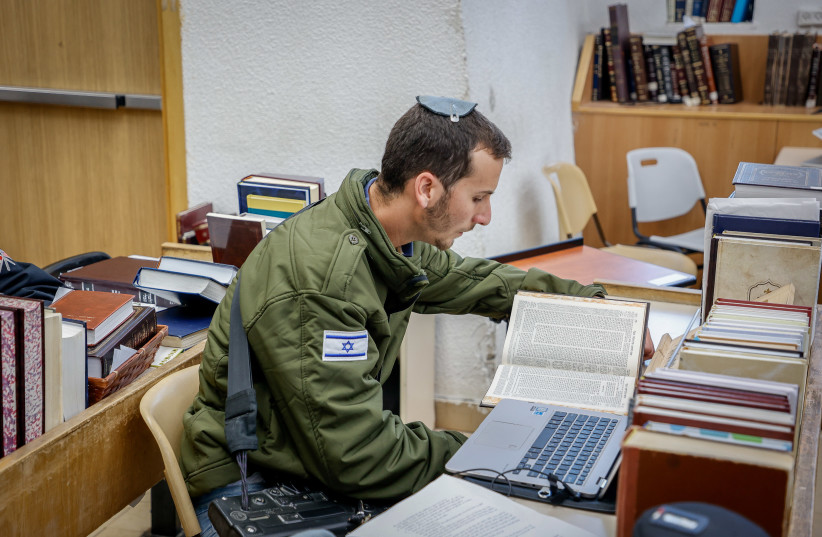Two major policy issues that the government and Knesset grappled with in the past week are highlighting the fundamental realization that Israel’s semi-autonomic haredi minority can no longer continue to cordon itself off from the rest of society.
The first is haredi exemption from IDF service. Politicians from all three haredi parties in the Knesset – Shas, Degel Hatorah, and Agudat Yisrael – are unwilling to budge on the matter despite the IDF’s acute need for manpower. Neither are their spiritual leaders.
Sephardi Chief Rabbi Yitzhak Yosef on Saturday night said that yeshiva students should leave Israel rather than join the IDF, and one of Degel Hatorah’s spiritual leaders, Rabbi Meir Tzvi Bergman, said the same.
Behind closed doors, some haredi politicians, particularly from Shas, have expressed more nuanced approaches, such as a gradual increase of military-age haredi men into IDF units adapted to their needs, including stringent dietary laws (kashrut) and gender segregation. All, however, insist that full-time yeshiva students should be given an exemption.
The most liberal haredi politicians are willing to consider plans that were on the table before October 7. But this may not be enough to cover the IDF’s needs, numerically or temporally. In other words, the minimum that the IDF and defense establishment need is more than the ceiling of what the haredi politicians are willing to give at the moment.
The vast range of haredi views on the draft
The spectrum within the haredi population itself is broader on both ends. Some haredi civilians are eager to join the IDF – and there are others, such as the extremist Peleg Yerushalmi, who protested with signs that said, “We would rather die than join the army.” But still, Israel requires a paradigm shift that haredi leaders currently seem unwilling to embrace.

The second is haredi education. Haredi leaders insist on maintaining the independence of their education systems, which they believe to be of utmost importance in ensuring haredi identity later in life. Israel’s Netanyahu-led governments have been very generous to these education systems over the years, often without ensuring they provide basic skills, such as English and mathematics, that would enable them to join the workforce later.
However, in its adapted 2024 budget, which is likely to pass this week, the government is conditioning extra funding for these school systems on their meeting several requirements – such as teaching a core curriculum and enabling oversight by Israel’s Education Ministry.
Here, too, the haredi leaders seem unwilling to budge. Degel Hatorah chairman MK Moshe Gafni, who is also the Knesset Finance Committee chairman, refused this week to hold votes on several tax hikes and tweaks in the budget aimed at increasing national income, in protest of the government’s requirements.
In his absence, the committee scrambled to package those provisions into a separate bill, so as not to hold up the passage of the national budget. The result is that these provisions, which ensure an increase of approximately NIS 6 billion in national income between the years 2024-2027, are currently on hold. Gafni is holding negotiations behind the scenes with the Finance Ministry, Education Ministry, and others.
Rationale behind opposition to education-system changes and draft
The common denominator in haredi opposition to Education Ministry oversight and IDF service is the fear that this will lead young haredim to abandon the haredi community and integrate into the rest of society. The blurring of the separation between the haredi community and the rest of Israel’s Jewish population is viewed as a threat to haredi identity and to the world of Torah study, which is the central tenet of that identity.
This fear is tangible. Indeed, no matter the length to which the IDF goes to create specific frameworks for haredim, joining the IDF means experiencing Israel’s military ethos, its values (known as “Ruach Tzahal," or The IDF spirit), and its function as a “melting pot” for Israeli society. The same is true for education. Bringing in education ministry oversight could lead to a broader definition of a core curriculum that would expose haredi students to basic civics or history.
Perhaps for the first time in Israel’s history, the consequences of the haredi refusal to integrate are tangible and immediate. The IDF needs more soldiers, and Israel cannot afford to continue pouring money into systems that do not lead to economic growth.
